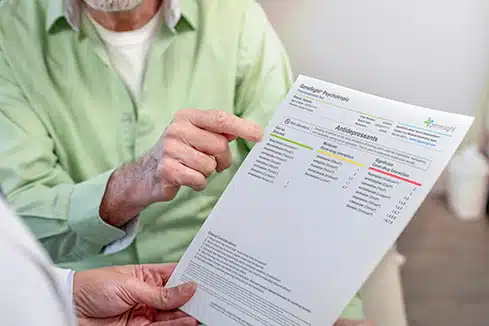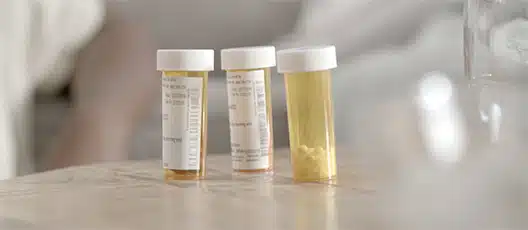GeneSight® Tests: Psychotropic and MTHFR


The GeneSight Psychotropic Test
The GeneSight Psychotropic test analyzes how your genes may affect your outcomes with medications commonly prescribed to treat depression, anxiety, ADHD, and other mental health conditions. The GeneSight Psychotropic test provides your clinician with information about which medications may require dose adjustments, may be less likely to work for you or may have an increased risk of side effects based on your genetic makeup.

The GeneSight MTHFR Test
The GeneSight MTHFR test shows whether a person has variation in MTHFR, an enzyme required to convert folic acid and dietary folate into its active form, L-methylfolate.
See The GeneSight Test Process
The GeneSight Test Process
To register to provide the GeneSight test, or if interested in taking the GeneSight test by referring or finding a registered provider, please start here.
Step 1
Your clinician collects a DNA sample in clinic by painlessly swabbing the inside of your cheek OR your clinician can order a patient collection kit to be sent to your home.
Step 2
The sample is sent to our lab for analysis.
Step 3
Test results are received and processed back typically within 2 business days.
Step 4
Results will be available from our portal and can be reviewed with the patient on their next visit. A clinician can contact our Medical Information team to review the patient’s results together.
To register to provide the GeneSight test, or if interested in taking the GeneSight test by referring or finding a registered provider, please start here.
Step 1
Your clinician collects a DNA sample in clinic by painlessly swabbing the inside of your cheek OR your clinician can order a patient collection kit to be sent to your home.
Step 2
The sample is sent to our lab for analysis.
Step 3
Test results are received and processed back typically within 2 business days.
Step 4
Results will be available from our portal and can be reviewed with the patient on their next visit. A clinician can contact our Medical Information team to review the patient’s results together.
A comprehensive report, personalized for you

The GeneSight Psychotropic report may help you avoid multiple medication trials by providing information about which medications may require dose adjustments, be less likely to work, or have an increased risk of side effects based on your genetic information.
The report also includes information on how a patient’s smoking status may affect their body’s metabolism of certain medications. The GeneSight results do not provide information on disease diagnosis, medication allergies, drug-drug interactions, or which medications will work best.
The report classifies over 60 mental health medications into four categories:
Medications on the GeneSight Psychotropic Report
There are over 60 mental health medications included on the GeneSight Psychotropic test. We continuously evaluate the scientific literature and are committed to providing clinicians with genetic insights to help inform treatment decisions.

Medication List (scroll horizontally to see the full list, click on each to read description)
Genes on the GeneSight Psychotropic Report
| CYP2D6 | CYP2C19 | CYP2C9 |
| CYP3A4 | CES1A1 | CYP2B6 |
| CYP1A2 | UGT1A4 | UGT2B15 |
| SLC6A4 | HLA-A*3101 | ADRA2A |
| HTR2A | HLA-B*1502 |
| COMT |
How We Offer the GeneSight Test
In Clinic GeneSight test
The GeneSight test is ordered and administered by your healthcare provider. The test is a simple cheek swab taken in your healthcare provider’s office.
GeneSight at Home
The GeneSight test is ordered by your healthcare provider and sent directly to you, so you may take it in the convenience of your home. The test is a simple cheek swab, taken in your home, and returned to our lab via FedEx for processing.
Educational Resources for You
Interpreting the GeneSight® Psychotropic Report
Take the Next Step - PD





